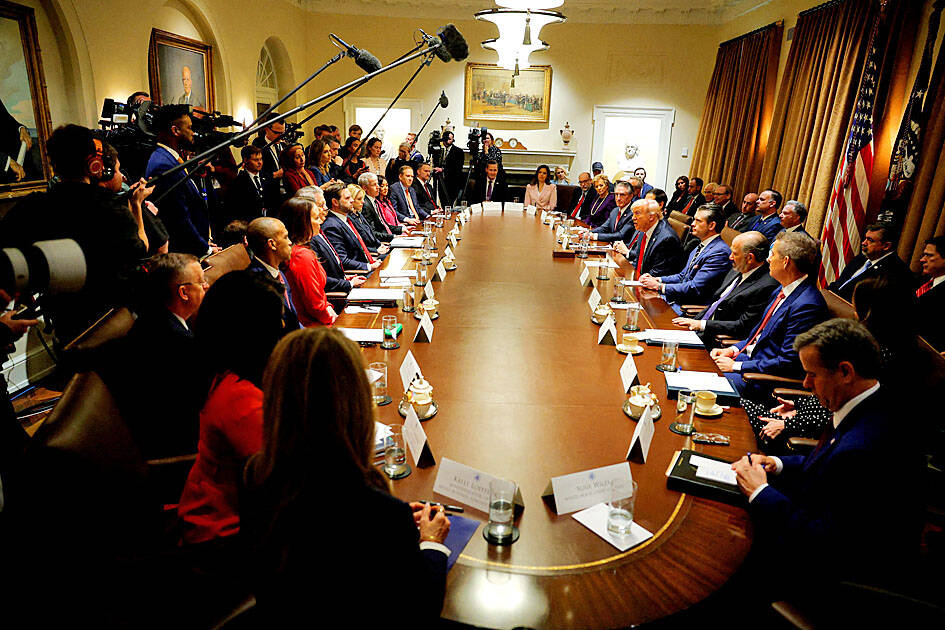US President Donald Trump on Wednesday again refused to make clear his stance on protecting Taiwan from a hypothetical takeover by China during his presidency.
Asked by a reporter during a Cabinet meeting whether it was his policy that China would never take Taiwan by force while he is president, Trump declined to give a definitive answer.
“I never comment on that,” he said. “I don’t comment on it because I don’t want to ever put myself in that position.”

Photo: REUTERS
Trump also reiterated that he has a “great relationship” with Chinese President Xi Jinping (習近平) and said that Washington welcomes good relations with Beijing.
“I see so many things saying that we don’t want China in this country,” Trump said.
“That’s not right. We want them to invest in the United States. That’s good. There’s a lot of money coming in, and we’ll invest in China. We’ll do things with China. The relationship we’ll have with China would be a very good one,” he added.
Trump in an interview on NBC in December last year said that he would “never say” if the US was committed to defending Taiwan against China.
Then-president-elect Trump said he had a “very good relationship” with Xi and would “prefer” if China did not attempt to invade Taiwan.
At the time, Trump said he would he would “have to negotiate things” before committing to the US’ defense of Taiwan in case of an invasion.
Trump’s stance on the cross-strait issue is a departure from that of former US president Joe Biden, who had said on several occasions that he would commit US troops in the event of a conflict in the Taiwan Strait.
Meanwhile, during an interview on Fox News on Wednesday, US Secretary of State Marco Rubio said his nation’s cross-strait policy had not changed.
“We have a longstanding position on Taiwan that we’re not going to abandon, and that is: We are against any forced, compelled, coercive change in the status of Taiwan,” he said.
“That’s been our position since the late 1970s, and that continues to be our position, and that’s not going to change,” he said when asked whether the US would defend Taiwan in the event of an invasion.
However, Rubio said he hoped that an invasion of Taiwan by China does not happen.
“The best way to prevent that from happening is to have the capability — a strong leader in the White House, which we have, President Trump — and the capability, military capability, to respond,” Rubio said.
Over the past few decades, the US has maintained a stance characterized as “strategic ambiguity,” which means not showing its hand on how it would respond in the event of a cross-strait conflict.
However, after Biden took office as president in January 2021, he repeatedly used language that appeared to diverge from that longstanding ambiguity, saying directly that the US would come to Taiwan’s defense in the event of a war.
On each of those occasions, administration officials later walked back Biden’s comments to some extent, signaling that the US’ policy on Taiwan had not changed.

‘DENIAL DEFENSE’: The US would increase its military presence with uncrewed ships, and submarines, while boosting defense in the Indo-Pacific, a Pete Hegseth memo said The US is reorienting its military strategy to focus primarily on deterring a potential Chinese invasion of Taiwan, a memo signed by US Secretary of Defense Pete Hegseth showed. The memo also called on Taiwan to increase its defense spending. The document, known as the “Interim National Defense Strategic Guidance,” was distributed this month and detailed the national defense plans of US President Donald Trump’s administration, an article in the Washington Post said on Saturday. It outlines how the US can prepare for a potential war with China and defend itself from threats in the “near abroad,” including Greenland and the Panama

The Chinese Nationalist Party (KMT) is maintaining close ties with Beijing, the Democratic Progressive Party (DPP) said yesterday, hours after a new round of Chinese military drills in the Taiwan Strait began. Political parties in a democracy have a responsibility to be loyal to the nation and defend its sovereignty, DPP spokesman Justin Wu (吳崢) told a news conference in Taipei. His comments came hours after Beijing announced via Chinese state media that the Chinese People’s Liberation Army’s Eastern Theater Command was holding large-scale drills simulating a multi-pronged attack on Taiwan. Contrary to the KMT’s claims that it is staunchly anti-communist, KMT Deputy

RESPONSE: The government would investigate incidents of Taiwanese entertainers in China promoting CCP propaganda online in contravention of the law, the source said Taiwanese entertainers living in China who are found to have contravened cross-strait regulations or collaborated with the Chinese Communist Party (CCP) could be subject to fines, a source said on Sunday. Several Taiwanese entertainers have posted on the social media platform Sina Weibo saying that Taiwan “must be returned” to China, and sharing news articles from Chinese state media. In response, the Mainland Affairs Council (MAC) has asked the Ministry of Culture to investigate whether the entertainers had contravened any laws, and asked for them to be questioned upon their return to Taiwan, an official familiar with the matter said. To curb repeated

Myanmar has turned down an offer of assistance from Taiwanese search-and-rescue teams after a magnitude 7.7 earthquake struck the nation on Friday last week, saying other international aid is sufficient, the National Fire Agency said yesterday. More than 1,700 have been killed and 3,400 injured in the quake that struck near the central Myanmar city of Mandalay early on Friday afternoon, followed minutes later by a magnitude 6.7 aftershock. Worldwide, 13 international search-and-rescue teams have been deployed, with another 13 teams mobilizing, the agency said. Taiwan’s search-and-rescue teams were on standby, but have since been told to stand down, as